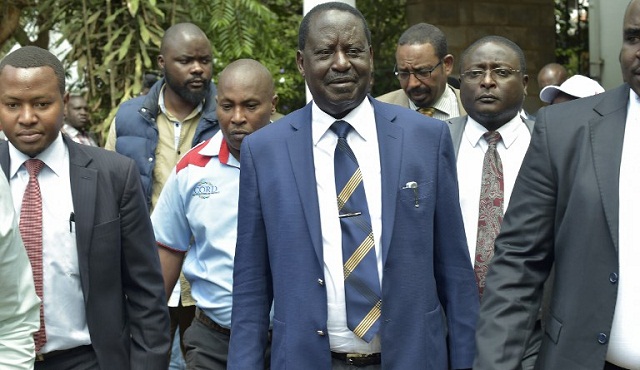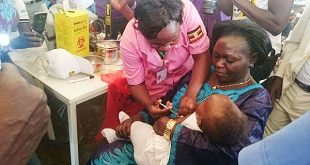
Kenya’s re-election contest saw President Uhuru Kenyatta winning a decisive victory on October 30 with 98 percent of the vote, hailing the result as a vindication of his victory in an initial August poll which was later overturned by the country’s Supreme Court. / AFP PHOTO / SIMON MAINA
Nairobi, Kenya | AFP | Raila Odinga, Kenya’s veteran opposition leader and one-time prime minister, on Tuesday promised a campaign of civil disobedience and protest against a presidential election he boycotted last week, keeping alive his long-held dream of winning the nation’s top job.
The 72-year-old has been a mainstay of Kenyan politics since the 1980s, but despite four attempts has never won the presidency.
Instead he seems to have inherited the political misfortune of his father, Jaramogi Oginga Odinga, who led the opposition for three decades but never the country.
For this year’s election, originally held in August, Odinga led a coalition called the National Super Alliance (NASA), overcoming traditional opposition divisions in what he saw as a surefire plan to defeat incumbent President Uhuru Kenyatta, 56, and his ruling Jubilee Party.
When Kenyatta won, Odinga cried foul and took his complaints to the Supreme Court, where a shock ruling overturning the result handed him a rare political victory.
However Odinga dug in his heels over reforms to the electoral commission, and pulled out of the October 26 election with two weeks to go, insisting it would be neither free nor fair.
His boycott worked, leaving Kenyatta to take a 98 percent landslide, but with a turnout of just 39 percent, down from 80 percent in August.
On Tuesday he rejected what he called a “sham and fraudulent exercise.”
“This election must not stand. If allowed to stand, it will make a complete mockery of elections,” Odinga said. “(…) Elections will become coronation rituals.”
“We will not allow two megalomaniacs to destroy the dreams of democracy,” he said, referring to Kenyatta and his deputy William Ruto. “We shall see to it that we conduct a free, fair and credible election as ordered by the Supreme Court.”
Odinga hopes to achieve this through a campaign of “dissent” and peaceful protest.
– Lifelong presidential hopes thwarted –
Kenyatta vs. Odinga has been a dynastic rivalry between two families that have dominated Kenyan politics in the independence era. A generation ago, Jaramogi Odinga lost out to Jomo Kenyatta, Kenya’s first post-independence leader.
Born into political royalty, a member of Kenya’s western Luo tribe, Odinga entered parliament in 1992 during the rule of president Daniel arap Moi. He had spent much of the previous decade in prison or in exile during the struggle for democracy.
He ran unsuccessfully for the presidency in 1997, 2007 and 2013, claiming to have been cheated of victory in the last two votes, as well as this year’s. Many observers agree with Odinga’s view that the 2007 election was deeply flawed.
That result triggered widespread politically motivated tribal violence that left more than 1,100 dead.
To stop the killings, international mediators forced a deal that saw the incumbent, Mwai Kibaki, continue as president, while Odinga took the specially created position of prime minister in a power-sharing government.
 The Independent Uganda: You get the Truth we Pay the Price
The Independent Uganda: You get the Truth we Pay the Price


